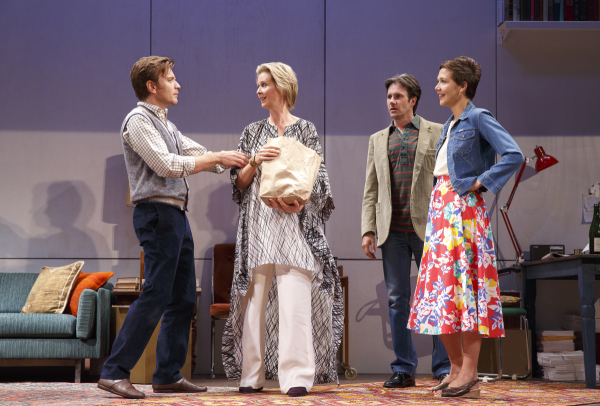The Real Thing
Ewan McGregor and Maggie Gyllenhaal make their Broadway debuts in this Tom Stoppard revival.

Maggie Gyllenhaal (Annie) in Tom Stoppard's The Real Thing, now being revived at Roundabout Theatre Company's American Airlines Theatre.
(© Joan Marcus)
Holding a cricket bat in one hand, Tom Stoppard's charmingly pompous leading man Henry boils down the function of literature to a beautifully concise analogy: "What we're trying to do is write cricket bats," he remarks, "so that when we throw up an idea and give it a little knock, it might travel."
The Real Thing, which first opened on Broadway in 1984, is one of Stoppard's finest cricket bats. Though at times indulgent in its pontificating, the play deftly tackles the ever-elusive yet ever-intriguing concepts of love, lust, and loyalty. It almost blasts out too many ideas for us to catch in a single viewing. Unfortunately, Roundabout Theatre Company's current Broadway revival at the American Airlines Theatre, helmed by Sam Gold, doesn't make those cricket balls any more aerodynamic. Rather, this emotionally distant and often confused production leaves a few at the foot of the stage.
Like three girlfriends enjoying a friendly jam session, Cynthia Nixon, Maggie Gyllenhaal, and Madeline Weinstein (on guitar) open the play with an acoustic sing-along to The Temptations' toe-tapping "I'll Be in Trouble," the lyrics of which prime us for the awaiting story of torturous love:
If you decide to make me blue, I'll be in trouble.
If you decide to be untrue, I'll be in trouble.
'Cause no matter what you do or say, I know I'm gonna love you anyway.
So if that's what you wanna do, I'll be in trouble.
That story seems to begin with a bang as Josh Hamilton, with a winning wit, ever-so-cunningly throws accusations of infidelity at a passive Cynthia Nixon, who buttons the scene with a dramatic exit. Only in the following scene do we discover we merely caught the climax of Henry's newest play, House of Cards (no relation to the Netflix series). It stars his thoroughly antagonistic wife, Charlotte (Nixon), who is frankly appalled by her character's lack of brazenness, and another actor named Max (Hamilton), whose true tongue is far duller than the one Henry sharpens for him onstage.
David Zinn's free-form set design almost indiscernibly changes from the world of the play to the reality of Henry and Charlotte's apartment. Here, the unhappily married couple awkwardly host Max and his late-arriving wife, Annie (Gyllenhaal). Now, Henry and Annie take on the roles of betraying lovers as their extramarital affair plays out under their spouses' noses. Their relationship, which evolves from a steamy secret to yet another less-than-perfect marriage, becomes the center of Stoppard's story, offering an intimate examination of the turns love can take, our missteps in tending to it, and the million-dollar question: When do you know if what you've got is the real thing? Stoppard cleverly expands this question far beyond love, with Henry and Annie at this initial gathering stepping into the realms of art politics in between stolen kisses. Henry, an admitted literary snob, penitently confesses his preference for The Crystals' "Da Doo Ron Ron" over Beethoven's Fifth Symphony, while Annie announces her support for a political rebel named Brodie (a lumbering Alex Breaux) whose destructive actions, she argues, hold far more value than those perpetrated by your typical arsonist.
Clearly there's a good deal of ground to cover, and Stoppard holds back none of his demanding verbiage as he digs through it with admirable depth. While the script's luscious humor and innate sensuality should be the elements that keep us invested in the largely intellectual piece, Gold's passionless staging within Zinn's abstract design cools this potentially powering flame. A towering blank white wall accents a series of austere furniture pieces intended to service every change of scene. Yet, the shifts of environment are often too subtle to situate us in any distinct time, place, or atmosphere. This may play to the piece's overall motif as our protagonists desperately grasp for an anchoring substance behind love, art, politics, and all the rest. Unfortunately, it does so at the expense of basic storytelling — one thing you can't skimp on when wrestling with Stoppard's dense prose.
McGregor and Gyllenhaal offer fine Broadway debuts as our central couple, Henry and Annie. McGregor aptly inhabits Henry's charming haughtiness with a self-awareness that maintains his likability even through his more conceited speeches. When left to his own devices in delivering Stoppard's text, the play's humor, charm, and fundamental humanity ring with perfect clarity. Despite a thoughtful performance, Nixon disappoints on the humor front, letting many of Stoppard's brashest jokes slip by — her subtle brand of comedy a less-than-perfect fit for the demonstrative and diva-esque Charlotte. McGregor, however, delivers on Stoppard's sentimentality, offering an uncharacteristically thoughtful philosophy about the nature of love to his daughter Debbie in the second act (a brief but charming cameo by Weinstein).
Gyllenhaal adds fewer contours to her Annie, portraying a surprisingly mild-mannered woman, despite the forthright behaviors, powerful principles, and fiery sexuality we know her to possess. Still, we faithfully and nonjudgmentally follow her along on her quest for this crazy little thing called love, even as she peppers the path with a series of questionable choices — one of these being a young actor named Billy, played by the exuberantly naïve Ronan Raftery.
Henry and Annie's relationship, however, jolts the intellect more than it does the heartstrings. Gold's direction leaves us cold as the sparse production and choppy transitions place us in an abstract ether, much more conducive to a philosophical thought experiment than an authentic observation of the human experience. Though Stoppard is undoubtedly a man of intellect, The Real Thing proves him to also be a man of substantial heart. Without this essential piece, it's just not the real thing.










